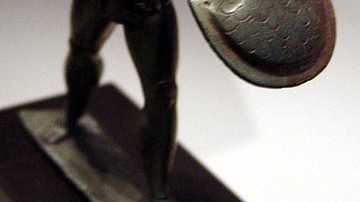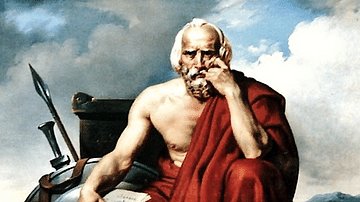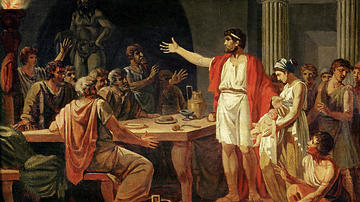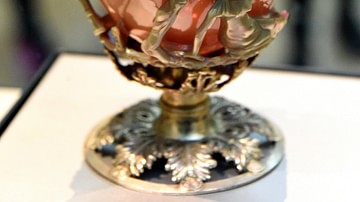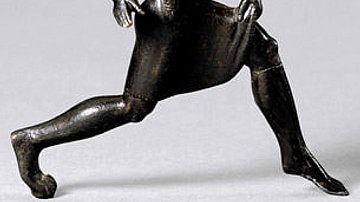
Lycurgus is considered the semi-mythical founder of classical Sparta and responsible for all of the city-state’s laws as well as its military and political institutions. He became better known to generations of Spartans as the lawgiver. He transformed Sparta into one of the most efficient military powers of Ancient Greece.
Initially, the Spartan city-state held sovereignty over the southern half of the Peloponnese, but with Lycurgus’s policies in place, it would expand its borders, acquiring dominance over the remainder of the peninsula. However, despite the credit given to Lycurgus for changing the face of Sparta and creating a “militaristic culture,” many historians remain skeptical of the life and accomplishments of this supposed lawgiver.
Debate Over His Existence
According to the historian Roderick Beaton in his The Greeks, Lycurgus never existed although his name remains attached to the Spartan system of laws. Ernie Bradford in his book Thermopylae wrote that the existence of Lycurgus is in question. Many (both modern and classical) deem him to be either a man, myth or god. Bradford dismissed Lycurgus as a lawgiver and added that because Sparta was a land power, it became essential for it to develop a warrior class. “The fact remains that some two centuries or more before the Persian invasions, the Spartans had adopted their iron code of rules which set them apart from all other men.” (61) Modern historians who do not accept the existence of Lycurgus believe the Spartan’s rigid code of law and order was the result of “coherent design” and the product of adaptation and change, not the work of a single individual.
In his Twelve Lives, the historian Plutarch (c. 45 - c. 125 CE) wrote in his biography of Lycurgus, “There is much uncertainty in the accounts which historians have left us of Lycurgus the lawgiver of Sparta that scarcely anything is asserted by one of them which is not called into question or contradicted by the rest.” (15) He hoped to write a history “adhering to those statements which are least contradicted and depending upon those which are most worthy of credit". (16) Even the period in which Lycurgus lived is called into question. Some historians believe he may have lived in the time of Iphitus, the Argonaut, while others such as the historian Apollodorus date him much earlier, before the advent of the Olympic games (776 BCE). The Greek historian Xenophon (430 - c. 354 BCE) believed him to be a contemporary of the ruling Heraclidae, descendants of Hercules.

Exile
Plutarch wrote how a potential life crisis arose after the birth of Lycurgus’s nephew – a crisis causing him to go into exile. With the possibility of his nephew’s ascension to the throne of Sparta, Lycurgus feared he might be implicated if something happened to the young child. Exile was his only option. He first traveled to Crete where he observed the island’s form of government and laws — rejecting some and approving others. It was there that he became acquainted with the philosopher Thales. From Crete, he crossed over into Asia where he examined the differences between the manners and rules of life of the Cretans, who were considered sober and temperate, and the Ionians, a people of delicate habits. It was in Ionia where he became familiar with the works of Homer; he believed the poet’s lessons of state and rules of morality would be of use upon his return to Sparta. His next step was Egypt where he observed the method of separating the military from the rest of the nation — “he transferred it from them to Sparta.” (19) Eventually, at the request of Sparta, he returned home and “applied himself without loss of time, to a thorough reformation, and resolved to change the whole face of the commonwealth.” (20) His fellow Spartans believed “in him alone was the true foundation of sovereignty to be seen, a nature made to rule, and a genius to gain obedience.” (19)
Before embarking on his reformation, Lycurgus left Sparta briefly to visit the Oracle of Apollo at Delphi. He prayed that “his laws would be the best and the commonwealth which observed them the most famous in the world." (20) Believing his prayers had been heard, he returned to Sparta. Early historians, those who believe in his existence, contend that the Oracle at Delphi guided Lycurgus into molding a Spartan society based on a pillar of three virtues: austerity, equality among the citizens, and military power. Thomas Martin in his Ancient Greece wrote that “The depth of Spartan’s respect for their system of government under law was symbolized by their belief that Apollo of Delphi had sanctioned it with an oracle called the Rhetra.” (96) The “Great Rhetra” refers to both the Delphi Oracle and the Spartan unwritten constitution. Laws that came from the Oracle (the Rhetra) were considered divine revelations. While historians may argue over his existence, Lycurgus remains credited with being the great lawgiver. Regardless of whether its strength came from the Oracle of Apollo, Lycurgus, or through adaptation, Sparta became a dominant city-state and ardent foe of ancient Athens.
Changes Begin
According to Plutarch, the lawgiver’s greatest and most important change came in the creation of the twenty-eight-member senate — a body with power equal to that of the kings and providing “steadiness and safety to the commonwealth.” (20) Believing there existed an inequality in land ownership, the next “and most hazardous” change he undertook was a redistribution of the land. With a thorough redistribution he hoped “to expel from the state arrogance and envy, luxury and crime and those yet more inveterate to disease of want and superflicity.” (23) Although Plutarch does not mention how it was accomplished, Lycurgus was able to convince the landowners of his proposals. Plutarch’s only comment was that Lycurgus convinced them that “(t)hey should live all together on an equal footing, merit to be their only road to eminence….” (23)
Not content with the drastic changes he had already made, Lycurgus collected all gold and silver, with iron becoming the new coinage. Now, there was no means to purchase foreign goods: no shipments arrived at the Laconian port; there were no longer rhetoric masters, no itinerate fortune tellers, no “harlot mongers,” no gold or silversmiths, no engravers, and no jewelers. Regarding the abolition of gold and silver ownership, Bradford wrote that after a battle, the Spartans “corrupt though they were to become at a later date, were so strictly indoctrinated with the laws of Lycurgus that they saw in wealth of golden objects the very things that caused corruption and softness amongst men.” (244) Plutarch maintained that Lycurgus bred his citizens in such a way that they were unable to live by themselves. Among the many restrictions, they were unable to travel abroad thereby unable to become acquainted with foreign rules of morality, habits, or different views of government. He also banished all strangers who were unable to give a reason for their being in Sparta, fearing they might “introduce something contrary to good manners.” (44) He further outlawed all needless and superfluous arts. Luxury soon died away. In the end, Lycurgus’s laws meant that to be rich was no longer an advantage over the poor.
The third major change was Lycurgus’s ordinance that all Spartans should eat in common, often viewed as “a more efficient blow against luxury in the desire of rich.” (25) A simple Spartan meal usually consisted of black broth, barley, some wine. figs and cheese. This change did not bode well with many of the wealthy who rose up against Lycurgus. There were ill words and stone-throwing which caused the lawgiver to seek refuge in a sanctuary. However, a young Spartan, Alexander, was able to get close enough to Lycurgus to strike him on his face, causing the loss of an eye. Seeing the disfigured leader, the crowd quietly dispersed, but the kind-hearted lawgiver did not punish the lad but invited him into his home. Lycurgus was viewed as being kind and gentle. Some historians, however, dismiss the loss of an eye story but still recognize that he may have been wounded. Regardless, he built a temple to Minerva in memory of the incident.
The Rhetra
Lycurgus never put his law into writing; in fact, the Rhetra forbade it. “He thought that the most material points … being imprinted on the hearts of their youth by a good discipline, would be sure to remain, and find stronger security, than any compulsion would be, in the principles of action formed in them by their best lawgiver, education.” (28) And, in order to provide a good education for the Spartan youth, it became necessary to regulate marriage — even the conception and birth of a child. With men often away at war, women were encouraged to participate in wrestling, running, throwing the quoit, and dart casting. A strong woman would give birth to strong and healthy children. Healthy boys made for good soldiers. After a child’s birth, he was taken before the elders of his tribe and examined. If it was “stout and well-made” then orders were given for it to live and be reared. If the child were "puny or ill-shaped" it was thrown into the chasm of Apothetae. It was considered ”neither for the good of the child itself, not for the public interest, that it should be brought up.” (32)
Lycurgus believed in developing good, dedicated soldiers, so reading and writing were only taught briefly; boys were trained primarily to endure and conquer in battle. Discipline was important and as they grew older, discipline was increased. As a rule, young men were forbidden to participate in agriculture, crafts, or any other kind of profession — only that of arms. At seven or eight a boy was taken from his home and enrolled in a small group where he remained, until he turned 13. ”Their whole life was devoted to the state.” (Bradford, 61) The essential qualities for a boy to be a good soldier were cunning, audacity and scrounging. While living in a dormitory, a young Spartan was fed a minimum of rations, for he was expected to steal food as a supplement. If caught, he was whipped without mercy.
Death
One day Lycurgus called a citizens’ assembly and “told them that he now thought everything reasonably well established, both for the happiness and the virtue of the state.” (45) However, he wanted to make one final trip to Delphi and make a sacrifice to Apollo. He told them to observe the laws until he returned. He even made the kings, senate and “whole commons” take an oath to maintain the established form of policy. He was told by the oracle that the laws he had established were excellent “and sufficient for a people’s happiness and virtue.” (45) After sending word of the oracle’s decision, he decided not to return to Sparta. He chose to end his life, contemplating a death “suitable to so honorable a life.” His death like his life is in question. He was possibly laid to rest in Sparta or Crete where his ashes were scattered into the sea.




